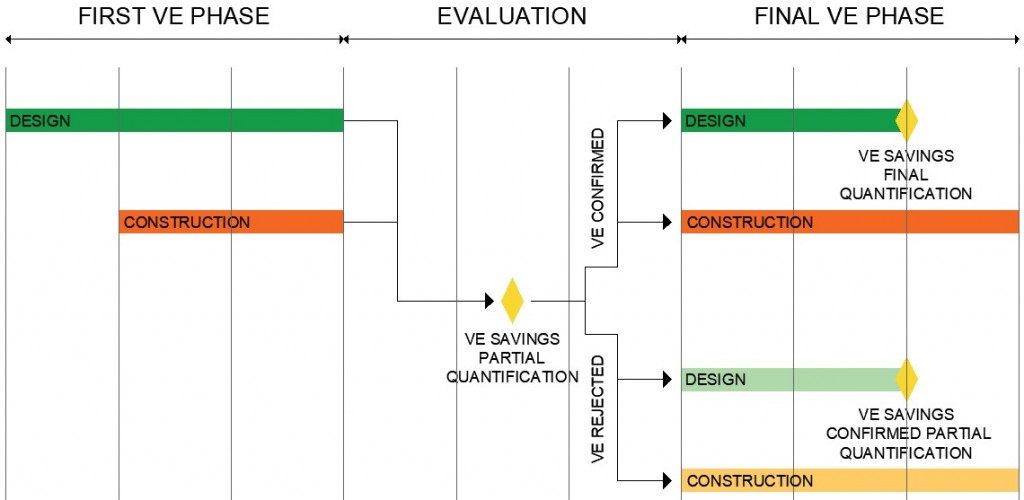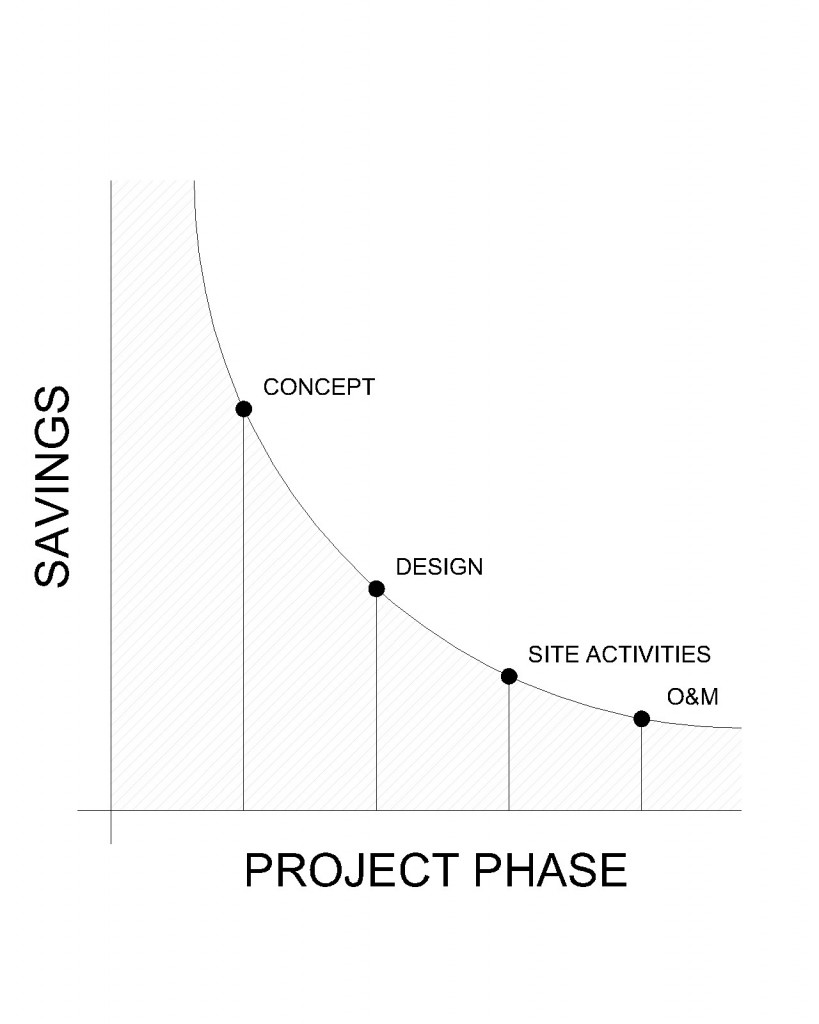AUTHOR: Danilo Guerrera
TUTORS: Prof. Giovanni Franchi, Ing. Giuseppe Maretti
INTERNSHIP: Impresa Pizzarotti & C. S.p.a
MASTER: Master in “Project Management delle opere strutturali e infrastrutturali” a.a 2019/20
Il lavoro svolto è frutto delle ricerche e dello studio svolto durante il Master in Project Management delle opere Strutturali e Infrastrutturali e del tirocinio svolto presso Impresa Pizzarotti & C. S.p.a durante l’anno accademico 2019-2020.
Contestualmente alle attivitá di Assistente Project Direct svolte durante il tirocino, ci si é posti l’obbiettivo di indagare le implicazioni ed i vantaggi derivanti dallo sviluppo di un processo di Value Engineering realizzato nel cantiere presso la quale il tirocino é stato svolto.
Con il termine Value Engineering si fa riferimento al processo di rielaborazione di un determinato progetto al fine di ridurne i costi senza pregiudicarne i benefici funzionali. Tale pratica ha pertanto la finalitá di produrre un eguale valore per il cliente con un minore utilizzo di risorse. Sebbene molteplici definizioni siano state attribuite in passato a tale processo, é rimasta nel tempo invariata la natura esplicitamente economica della pratica ed é pertanto obbiettivo della presente trattazione indagare gli input e gli obbiettivi che orientano ne orientano le decisioni.
Lo svolgimento delle attivitá di ricerca é stato articolato secondo un iter metodologico strutturato ed orientato all’indagine del ambito di studio a partire dalle procedure e dalle ricerche precedentemente svolte nello stesso ambito da personalitá di rilievo nell’ambito sia accademico che industriale.
Mediante una scomposizione in macrofasi é stato possibile indagare il potenziale impatto derivante dall’implementazione della VE in un progetto edilizio. Ne emerge la valutazione che le considerazioni e azioni implementate nelle prime fasi di scope definition possono risultare estremamente piú profittevoli e strutturate rispetto a quelle avanzate in fase di design, di produzione o di manutenzione.
La libertá di gestione e di modifica delle soluzioni progettuali é tuttavia sempre vincolata dalle specifications di progetto le quali sono emesse dal cliente nei confronti del Designer e del Main Contractor.
Per poter dare una corretta definizione dei ruoli e delle attivitá svolte da ognuno dei soggetti coinvolti si é reso necessario introdurre quelli che sono i caratteri principali della soluzione contrattuale impiegata e le relative implicazioni sul caso studio.
La gestione del progetto é stata congeniata in conformitá con le procedure aziendali, le quali, hanno come strumento di controllo il Project Management Plan, associabile in questo contesto al piano di commessa. Piú propriamente la procedura di gestione del progetto è stata strutturata secondo il protocollo di gestione aziendale definito “Integrated Management System” (IMS). Essa consente una gestione delle attività secondo un’ottica di tipo gerarchico-funzionale in una stretta cooperazione tra le attività svolte On Site e quelle svolte dall’HeadQuarter. Essa detta procedure e istruzioni applicabili al processo di gestione del progetto in oggetto.
Ai fini della ricerca sono stati pertanto indagati gli strumenti maggiormente coinvolti nel processo di Value Engineering, ovvero il Risk Management Plan e l’Economical Plan. Essi hanno consentito di definire le principali variabili di progetto e le modalitá di analisi richieste secondo un ottica economico-funzionale. É stato infine indagato il processo attraverso la quale l’idea di progetto é stata analizzata e indagata insieme al cliente ed ai vari stakeholder.
Strumenti tipicamente appartenenti al value management hanno consentito di indagare le potenziali implicazioni delle soluzioni rispetto ad altre esperienze similarmente maturate in contesti differenti dalle parti coinvolte, tuttavia, la voltatilitá del mercato e le numerose variabili coinvolte determinano la ovvia necessitá di approciare procedure quali la value engineering con sufficiente maturitá nella gestione del rischio e cognizione di come essi debbano essere integrati in un processo produttivo talvolta giá avviato.
Nonostante la volontà delle parti coinvolte di conseguire i massimi benefici resta ad esclusivo onere del Contractor l’obbligo di indagare e definire tutte le possibili strategie di intervento che possano venire incontro agli obbiettivi di Scope precendemente esposti ed il cui soddisfacimento rappresenta di fatto l’obbiettivo cardine di qualunque progetto edilizio.
FOR INTERNATIONAL STUDENTS:
The following work is the result of researches and studies carried out along the Master in Project Management of Civil Structure and Infrastructure Works and the internship performed at Impresa Pizzarotti & C. S.p.a along academic year 2019-2020.
Consistently with the Project Director’s Assistant activities carried out along the internship, the aim was to investigate the implications and advantages deriving from the development of the Value Engineering process performed on the construction site where the internship took place.
The term Value Engineering refers to the reworking process of a given project to reduce its costs without compromising its functional benefits. Therefore, this practice has the purpose of producing equal value for the customer with less use of resources. Although multiple definitions have been attributed in the past, this process’s explicit economic nature remained unchanged over time and it is therefore the objective of this discussion to investigate inputs and objectives which leads the decision-making.
The researches activities have been articulated according to a structured methodological process. The same has been orderly oriented along the investigation of the field of study by starting from the procedures and research previously carried out in the same field by prominent personalities in both the academic and industrial fields.
By breaking down into macro-phases, it has been possible to investigate the potential impact deriving from the implementation of the VE in a building project.
The assessment highlights how considerations and actions implemented in the early stages of scope definition can be extremely more profitable and structured than those advanced in the design, production, or maintenance stage.
The freedom to manage and modify the design solutions is however always bound by the project specifications which are issued by the Client to the Designer and the Main Contractor.
In order to be able to give a correct definition of roles and activities carried out by each of the subjects involved, it was necessary to introduce the main characteristics of the contractual solution used and the relative implications on the case study.
The management process has been designed in accordance with the company procedures which have the Project Management Plan as a control tool. More specifically, the project management procedure was structured according to the corporate management protocol defined as “Integrated Management System” (IMS). It allows for the activities to be managed according to a hierarchical-functional perspective in close cooperation between the activities carried out on site and those carried out by the HeadQuarter. It rules procedures and instructions applicable to the management process of the project.
For the purposes of the research, with specific reference to the Value Engineering process, the most involved plans have been subject of further investigations. Specifical researches has been performed about Risk Management Plan and Economic Plan accordingly. They made it possible to define the main project’s variables and the required analysis methods to be involved according to an economic-functional perspective. Finally, the process through whom the project idea was analyzed and investigated together with the customer and the various stakeholders has been investigated and divided in pragmatical way.
Tools typically belonging to value management world made it possible to investigate the potential implications of the solutions with respect to other experiences similarly performed in different contexts from the different involved parties. However, the volatility of the market and the numerous variables involved determined the obvious need to approach procedures such as value engineering with sufficient maturity in risk management and experience about how to implement them into the already ongoing process.
Despite the willingness of the involved parties to achieve the maximum benefits, the obligation to investigate and define all the possible intervention strategies that can meet the Scope of Works’ requirements remains at the sole responsibility of the Contract as they represent the effective last target of any construction activity.


